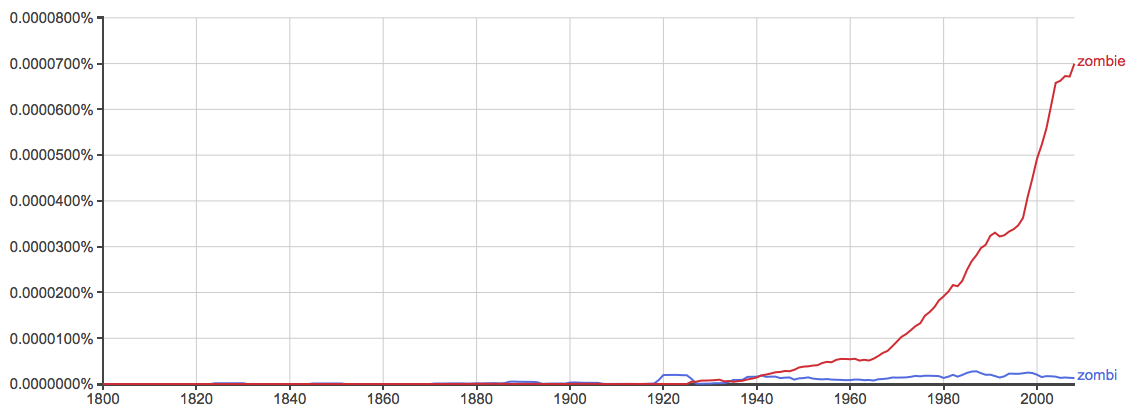Should you call a reanimated corpse a zombi, or a zombie? This question might seem like it only concerns a narrow group of authors writing low-grade horror fiction.
On the other hand, hordes of the shambling undead are experiencing a resurgence in American pop culture, with wildly popular TV shows and films earning production companies millions of dollars each year.
At one point, AMC’s The Walking Dead nearly quadrupled its budget on a weekly basis in ad revenue alone. And in a notable deviation from conventional horror tropes, neither zombi nor zombie is ever spoken by anyone on the show.
Consequently, if you’re a staff writer for The Walking Dead, feel free to stop reading now and go back to snowboarding down your mountain of cash. For anyone else who can’t decide whether to use zombie or zombi in their latest screenplay, read on for an explanation of these two words.
What is the Difference Between Zombi and Zombie?
In this article, I will compare zombi vs. zombie. I will outline the definition of the word and explain its proper context. Then, at the end, I will discuss a useful memory tool that will help you decide whether to use zombi or zombie when you’re writing about the undead.
When to Use Zombi
What does zombie mean? According to Garner’s Modern English Usage, zombi “derives from nzambi, the Bantu name of a West African python deity thought to raise the dead.”
Although zombi is the older term, it has faded from common use in contemporary English, as illustrated by this chart:

While this graph is not scientific or precise (it ignores many print sources to focus only on books written in English since 1800), it is useful for identifying a long-term trend.
When to Use Zombie
 What does zombie mean? Zombie, meanwhile, is a much more commonly used noun that refers to a reanimated corpse, or more broadly, a being which has been brought back from the dead and now feasts on the living.
What does zombie mean? Zombie, meanwhile, is a much more commonly used noun that refers to a reanimated corpse, or more broadly, a being which has been brought back from the dead and now feasts on the living.
For example,
- Seeking shelter from the shambling zombie horde, Rick hid inside a tank.
- Scriptwriters’ use of zombies as a metaphor for the culture of mindless American consumerism has quickly devolved from an insightful critique to lazy shorthand.
- As the last few passengers who haven’t succumbed to the zombie horde beg to be let in, those inside must quickly decide: Should they open the door and risk their own safety, or stand by and watch as others get mauled to death? –LA Times
Trick to Remember the Difference
 Here is a helpful trick to remember zombie vs. zombi in your writing.
Here is a helpful trick to remember zombie vs. zombi in your writing.
Unless you specifically reference the Bantu deity nzambi in your writing, you should avoid zombi. This word is now used so infrequently that it will be pointlessly distracting to you readers. In any other context involving a reanimated corpse, zombie is the preferred term.
Zombies are everywhere! Since zombie ends with an E and everywhere begins and ends with that letter, it should be difficult to remember to use zombie instead of zombi.
Summary
Is it zombi or zombie? Zombi is derived from the Bantu word for a snake god. Zombie refers to a reanimated corpse.
Zombi is rarely used in contemporary English. In most contexts, zombie is the preferred term for this type of undead being.
You can remember to use zombie by thinking about the E that it shares with the word everywhere. The undead are everywhere in American popular culture, and you should call them zombies.
To summarize,
- Zombie is the preferred spelling.
- Zombi is an outdated spelling no longer used.
Contents
